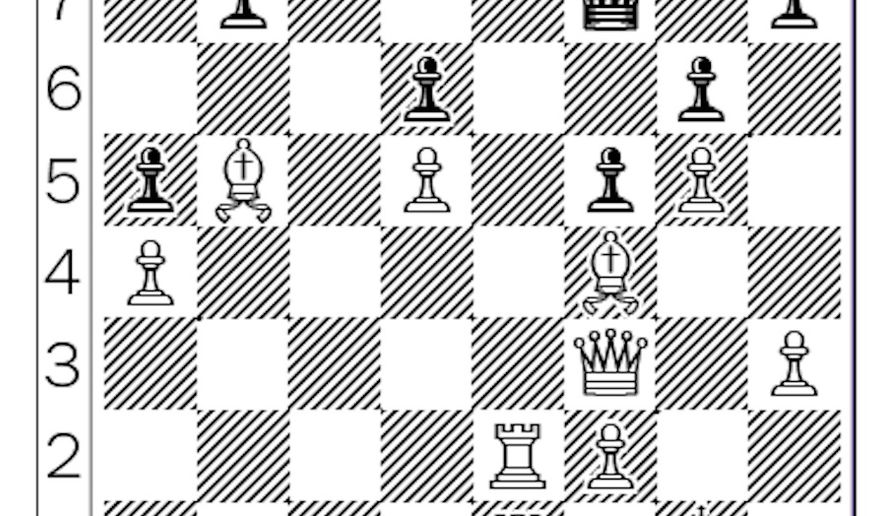Anatoly Lein, the Leningrad-born grandmaster who was one of the last living members of the wave of Soviet refugees who transformed the U.S. chess landscape in the 1970s and 1980s, died March 1 at the age of 86 at his home outside Cleveland.
Lein, whose long career included wins over such greats as Vasily Smyslov and Mikhail Tal and induction into the World Chess Hall of Fame in 2005, earned a permanent entry in the annals of Washington-area chess by winning 1976 U.S. Open, held on the campus of Fairfax’s George Mason University. Lein shared first that year with fellow Soviet emigre Leonid Shamkovich, even as a young Class B player named David R. Sands was laboring his way to 6-6 result far way from the top boards. The Open that year was the largest and strongest ever held up to that time in the DMV.
The long string of emigres from the old Soviet Union and Eastern Europe — an illustrious group led by Lein and Shamkovich that would include such “American” stars as Boris Gulko, Roman Dzindzichashvili, Lev Alburt, Lubosh Kavalek, Gregory Kaidanov and Gata Kamsky — provided a jolt of talent and energy in the years after Bobby Fischer walked away from the game.
The Fairfax U.S. Open was one of the first event Lein played in after leaving the Soviet Union that same year, and first place was on the line when he met veteran U.S. GM Arnold Denker in the 12th and final round. The newcomer first outplays his opponent positionally in this Nimzo-Indian Saemisch, then finds a nice tactic to win decisive material.
The game turns on the sequence 15. d5 Nd4!? (a temporary sacrifice as White has to return the pawn, but Lein will emerge from the ensuing play with the two bishops, more active pieces and a target in Black’s weak c-pawn; also weak was 15…Ne7 16. Nb5 Qxd2+ 17. Kxd2 Bxb5 18. cxb5 Nd7 19. Rhc1, and the White bishops are strong) 16. Bxd4 exd4 17. Qxd4 b5 18. 0-0 bxc4 19. Rfc1 (Bxc4 Qc5! and White must lose a piece on the c-file) Qc5 20. Qxc5 Rxc5 21. Rcb1, and White has control of the board’s one open file.
White’s piece activity — and the awkward placing of Black’s rooks — proves decisive in the grandmaster’s hands: 25. f4 Nd7 (the c5-square looks like an inviting landing spot for the knight, but White gets to move first) 26. Bg4! Rb8 (Rd8 27. Rb5 Ra6 [Rxb5 28. axb5 Ra8 29. Bxd7 Bxd7 30. b6 a5 31. Ke3 Ke8 32. Kd4] 28. Rb4 Nb6 29. a5 Ke7 30. Ra2 Nd7 32. Be2 and White is winning) 27. Rxd7 Bxd7 28. Bxd7 Rb2+ 29. Kf3 Ra6? (hastening the end as White’s next puts the rook in prison) 30. a5! Rb3 31. Bb5! Rxc3+ 32. Ke2 Rc2+ 33. Ke3, and Black resigned as 33…Rxg2 34. Bxc4! Rxh2 35. Bxa6 is an easy win.
PHOTOS: Celebrity deaths in 2018: The famous faces we've lost
Today’s diagram offers a prime example of Lein’s combinational imagination, in a game from the 1981/1982 Hastings Chess Congress against GM Murray Chandler. The New Zealand star has just played 27…Qd7-f7, and Lein brilliantly breached the Black defense with 28. Be8! Qg8 29. Re7!! Bxe7 30. Rxe7 Qf8 (Rxe8 31. Qc3+ leads to mate) 31. Qc3+ Kg8 32. Bf7+ Qxf7 33. Rxf7 Kxf7 34. Qf6+ Ke8 35. Qh8+, and Black resigned facing 35…Qxh7+ Kf8 37. Qh8+ Ke7 38. Qg7+ Ke8 39. Qg6+ and Black’s position collapses.
—-
The fight to pick a challenger to world champion Magnus Carlsen of Norway kicks off in earnest Saturday in Berlin with the FIDE Candidates Tournament. American GMs Fabiano Caruana and Wesley So are in the eight-player field for a double-round robin event that ends March 28. The world title match is set for London in November.
Lein-Denker, 77th World Open, Fairfax, Va., August 1976
1. d4 Nf6 2. c4 e6 3. Nc3 Bb4 4. a3 Bxc3+ 5. bxc3 O-O 6. Bg5 d6 7. f3 c5 8. e4 Qa5 9. Qd2 cxd4 10. cxd4 Nc6 11. Ne2 h6 12. Be3 Bd7 13. Nc3 Rfc8 14. Be2 e5 15. d5 Nd4 16. Bxd4 exd4 17. Qxd4 b5 18. O-O bxc4 19. Rfc1 Qc5 20. Qxc5 Rxc5 21. Rcb1 Kf8 22. Kf2 Rac8 23. Rb7 Ra5 24. a4 Be8 25. f4 Nd7 26. Bg4 Rb8 27. Rxd7 Bxd7 28. Bxd7 Rb2+ 29. Kf3 Ra6 30. a5 Rb3 31. Bb5 Rxc3+ 32. Ke2 Rc2+ 33. Ke3 Black resigns.
• David R. Sands can be reached at 202/636-3178 or by email dsands@washingtontimes.com.
• David R. Sands can be reached at dsands@washingtontimes.com.




Please read our comment policy before commenting.